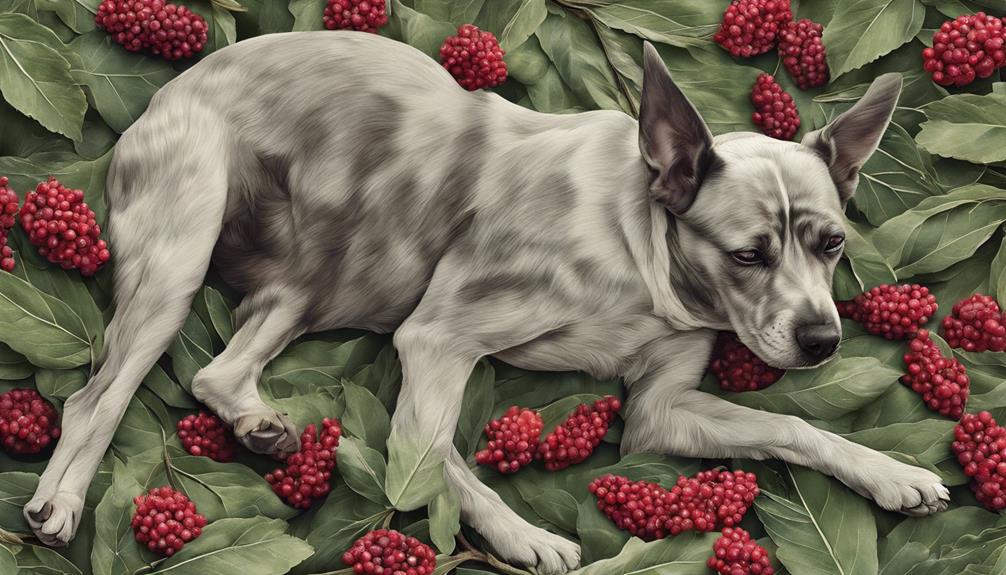If your dog eats laurel berries, it's essential to act fast. Laurel berries are toxic, causing symptoms like vomiting and diarrhea. Contact a vet immediately and prevent further ingestion. Treatment may involve inducing vomiting and IV fluids. Long-term effects can harm organs, so quick care is essential. Laurel poisoning can be costly to treat, ranging from hundreds to thousands of dollars. Understanding the risks of laurel berries and seeking fast veterinary care can save your pet's life. More insights await on the dangers of laurel berries for your furry friend.
Key Takeaways
- Laurel berries contain cyanogenic toxins harmful to dogs.
- Symptoms of poisoning include vomiting, diarrhea, and lethargy.
- Immediate veterinary attention is crucial if ingestion is suspected.
- Long-term effects can include organ damage and metabolic imbalances.
- Treatment costs for laurel poisoning can vary from hundreds to thousands of dollars.
Toxicity of Laurel Berries to Dogs
Laurel berries pose a significant threat to dogs due to their high levels of cyanogenic toxins, which can result in cyanide poisoning. These toxic berries, especially cherry laurel, contain compounds that can be harmful if ingested by our furry friends. Symptoms of laurel berry poisoning in dogs may include vomiting, diarrhea, abdominal pain, and lethargy. In severe cases, ingestion of cherry laurel berries can lead to more serious symptoms like breathing difficulties, seizures, coma, and even death. If you suspect your dog has eaten laurel berries, it's critical to seek immediate veterinary attention.
To prevent such incidents, it's vital to make sure that laurel berries aren't accessible to our canine companions. Dogs have sensitive stomachs, and ingesting these berries can lead to stomach upset and potentially dangerous health issues. By being watchful and keeping laurel berries out of reach, we can protect our beloved pets from the dangers of cyanide poisoning.
Symptoms of Laurel Berry Ingestion

After consuming laurel berries, dogs may exhibit symptoms such as vomiting, diarrhea, abdominal pain, and lethargy. Additionally, they might display signs like drooling, pawing at the mouth, discomfort, and weakness. These symptoms are important indicators of laurel berry poisoning in dogs and should not be ignored. Observing for specific signs such as diarrhea, lack of appetite, and stomach upset is essential if you suspect your dog has ingested laurel berries. If you notice vomiting, diarrhea, abdominal pain, lethargy, drooling, or pawing, it is essential to seek immediate veterinary attention to prevent any further complications.
| Symptoms | Description | Action |
|---|---|---|
| Vomiting | Expelling stomach contents forcefully | Seek vet attention |
| Diarrhea | Loose or watery stools | Monitor closely |
| Abdominal Pain | Discomfort in the stomach area | Contact a vet promptly |
| Lethargy | Lack of energy or enthusiasm | Seek professional help |
Immediate Actions to Take

Upon suspecting laurel berry ingestion in dogs, immediate action must be taken to secure their safety and well-being. Here are some vital steps to follow:
- Observe for Symptoms: Keep a close eye on your dog for signs of poisoning such as vomiting, diarrhea, abdominal pain, or lethargy.
- Contact a Veterinarian: Seek immediate veterinary attention if you suspect your dog has ingested laurel berries, especially if it's Carolina cherry laurel, as it can lead to severe symptoms like breathing difficulties, seizures, coma, or even death.
- Prevent Further Ingestion: Train your pets to avoid unknown berries or plants and keep them away from laurel bushes to prevent accidental ingestion.
- Do Not Delay: Time is of the essence in such cases, so act promptly to guarantee the best possible outcome for your furry friend.
Taking these immediate actions can make a significant difference in the well-being of your dog if laurel berry ingestion occurs.
Veterinary Treatment Options

When a dog eats laurel berries, it's important to seek immediate veterinary care.
The vet will conduct a medical evaluation to assess potential toxicity risks.
Treatment options may include inducing vomiting, administering activated charcoal, and providing supportive care as needed.
Medical Evaluation and Care
In cases of laurel berry ingestion in dogs, veterinary treatment options typically involve inducing vomiting to remove the berries from the system. It's vital to seek prompt veterinary care to manage complications effectively.
Here are some key steps in the medical evaluation and care process:
- Activated charcoal: Helps absorb toxins from laurel berries in the digestive tract.
- IV fluids: Necessary to maintain hydration and support kidney function in poisoning cases.
- Medications: Prescribed to control symptoms like nausea or pain for the dog's comfort.
- Monitoring: Regular follow-up and observation are critical to ensure the dog's recovery progresses smoothly.
Potential Toxicity Risks
Let's consider the veterinary treatment options for addressing potential toxicity risks associated with laurel berry ingestion in dogs. Laurel berries contain cyanogenic toxins that can lead to poisoning in dogs, showing symptoms like vomiting, diarrhea, abdominal pain, and lethargy.
If you suspect laurel berry poisoning, immediate veterinary attention is critical to prevent severe outcomes such as seizures or coma. Treatment for laurel berry ingestion may involve inducing vomiting, using activated charcoal, providing IV fluids, and administering medications to manage symptoms.
Pet owners play an essential role in preventing toxicity risks by keeping pets away from laurel bushes. If ingestion occurs, seek veterinary advice promptly to guarantee your dog receives the necessary care.
Treatment Plan Options
To address the potential toxicity risks associated with laurel berry ingestion in dogs, veterinarians may implement a treatment plan that includes inducing vomiting and administering activated charcoal. This quick intervention helps remove the berries and absorb any toxins present in the digestive system.
In severe cases of laurel berry poisoning, dogs may require essential care and monitoring at a veterinary clinic to manage complications effectively. Veterinarians may also prescribe medications to counteract the effects of the toxins.
Potential Long-Term Effects

Through prolonged exposure to laurel berries, dogs may experience damage to their internal organs such as the liver and kidneys, leading to potential long-term health complications.
Laurel berries contain toxins that can be poisonous to dogs over time. Chronic ingestion of these berries can result in persistent gastrointestinal issues, affecting the dog's digestive system and nutrient absorption.
Continued consumption of laurel berries may also contribute to metabolic imbalances, impacting the dog's overall health. Over time, the toxins from laurel berries can weaken the immune system, making the dog more susceptible to illnesses.
Additionally, the gradual damage to the liver and kidneys can lead to systemic health issues that may require long-term management. It's essential to be vigilant and prevent dogs from accessing laurel berries to avoid these detrimental long-term effects on their internal organs and overall well-being.
Preventing Laurel Berry Consumption

To prevent the harmful effects of laurel berries on dogs, pet owners must take proactive measures to make certain their pets don't consume these toxic berries. Here are some essential steps to safeguard your furry friends:
- Monitor Your Pet: Keep a close eye on your dog while outdoors, especially near areas where laurel bushes or trees are present.
- Training: Train your dog to avoid eating unknown berries or plants by using positive reinforcement techniques.
- Secure Environment: Guarantee your yard is free of laurel plants or berries to prevent accidental ingestion.
- Immediate Action: If you suspect your dog has consumed laurel berries, seek immediate veterinary attention to address any potential poisoning.
Risk Factors for Laurel Poisoning

Understanding the potential risk factors associated with laurel poisoning in dogs is essential for pet owners to guarantee the safety and well-being of their furry companions. Laurel berries, particularly those from cherry laurel plants, contain cyanogenic toxins that can lead to cyanide production in the body when ingested by dogs. This can result in severe symptoms such as drooling, abdominal pain, weakness, vomiting, and diarrhea.
If a dog shows any of these signs after consuming toxic berries, immediate veterinary attention is vital to prevent further complications or even death. To prevent laurel poisoning, pet owners should train their dogs to avoid unknown berries or plants, especially those with toxic properties like laurel berries. By being aware of the risks associated with laurel poisoning and implementing prevention strategies, such as keeping potentially harmful plants out of reach, pet owners can help safeguard the well-being and health of their beloved canine companions.
Common Laurel Berry Varieties

When examining common laurel berry varieties, it's important to be mindful of the distinct characteristics that set them apart.
- English Laurel: These berries are highly toxic to dogs, containing cyanide that can be harmful upon ingestion.
- Mountain Laurel: Known for its beautiful flowers, the berries of this plant can cause symptoms like vomiting and diarrhea in dogs.
- Portuguese Laurel: While aesthetically pleasing, the berries of this variety can lead to abdominal pain and lethargy in pets.
- Spotted Laurel: The berries of this plant should be kept out of reach of pets as they can cause discomfort and poisoning if consumed.
Each of these laurel berry varieties poses a risk to your dog if ingested, potentially leading to serious health issues. It's essential to make sure that your furry friend is kept away from these toxic berries to prevent any accidental poisoning. If ingestion occurs, immediate veterinary attention is necessary to provide the appropriate care and treatment for your pet's well-being.
Importance of Quick Veterinary Care

Prompt veterinary care is vital when a dog consumes laurel berries due to their toxic nature. Laurel berries can cause symptoms such as vomiting, diarrhea, and abdominal pain in dogs. Immediate intervention is essential to prevent severe effects like breathing difficulties, seizures, coma, and even death.
Consulting a veterinarian promptly is important for diagnosing and treating laurel berry poisoning effectively. Early veterinary attention can greatly improve the prognosis and outcome for dogs that have ingested laurel berries. Remember, time is of the essence when dealing with toxic ingestions like laurel berries.
Your veterinarian can provide the necessary care and support to help your dog recover from laurel berry poisoning. So, if you suspect your dog has eaten any laurel berries, don't hesitate to seek veterinary care immediately to guarantee the best possible outcome for your furry friend.
Cost of Laurel Poisoning Treatment

When a dog ingests laurel berries, the financial implications of treatment can vary widely, ranging from a few hundred to several thousand dollars. This includes expenses for tests, medications, hospital stays, and ongoing care.
It's important to contemplate the financial aspects of treating laurel poisoning in dogs and to be prepared for potential costs associated with veterinary care.
Cost of Treatment
The cost of treating laurel poisoning in dogs varies depending on the severity of the poisoning and the necessary interventions. Veterinary care for laurel poisoning may include diagnostic tests, medications, and supportive care, all contributing to treatment expenses.
After the initial treatment, monitoring for long-term complications is essential, potentially requiring follow-up care and additional veterinary visits. Implementing preventive measures like dietary adjustments and environmental changes can help reduce the risk of future incidents, ultimately lowering overall costs.
Financial Considerations
Considering the potential financial implications of treating laurel poisoning in dogs underscores the importance of essential measures to safeguard both pets and finances. Veterinary costs for hospitalization and treatments can be substantial, while monitoring long-term complications may lead to additional expenses.
Dietary adjustments and environmental changes post-treatment can also contribute to ongoing financial commitments for pet owners. Educating oneself on toxic plants and implementing preventive measures is vital not only for the well-being of our furry friends but also to alleviate the financial burden associated with treatment expenses.
Being aware of the financial impact of laurel poisoning emphasizes the significance of understanding pet finances and taking necessary steps to prevent such incidents, ultimately preserving both the health of our pets and our wallets.
Frequently Asked Questions
What Happens if Dogs Eat Laurel Berries?
If dogs consume laurel berries, they can experience severe symptoms like vomiting, diarrhea, abdominal pain, and lethargy due to cyanide toxicity. Cherry laurel berries are particularly dangerous, causing breathing difficulties, seizures, coma, and even death.
Immediate veterinary attention is vital to address stomach upset from laurel berries ingestion. Prevent dogs from consuming laurel berries, monitor for signs of poisoning, and seek prompt veterinary care if needed.
What Happens if a Dog Eats a Poisonous Berry?
If a dog eats a poisonous berry, it can lead to serious health issues. Symptoms may include vomiting, diarrhea, abdominal pain, and lethargy. In severe cases, breathing difficulties, seizures, coma, and even death can occur.
It's vital to seek immediate veterinary care if your dog ingests a toxic berry. Monitoring for symptoms and acting promptly can help manage poisoning and safeguard your dog's well-being.
Are Carolina Cherry Laurel Berries Poisonous to Dogs?
Yes, Carolina cherry laurel berries are toxic to dogs. Ingesting these berries can be life-threatening due to the cyanide they contain. Symptoms of poisoning include vomiting, diarrhea, difficulty breathing, seizures, and even death.
If your dog shows signs of poisoning like drooling or weakness after eating these berries, seek immediate veterinary care. Monitoring for symptoms and prompt treatment are essential for a better prognosis.
Are Japanese Laurel Berries Poisonous to Dogs?
Japanese Laurel berries are toxic to dogs. Ingesting these berries can lead to symptoms like vomiting, diarrhea, and abdominal pain.
It's essential to keep your dog away from Japanese Laurel berries to prevent poisoning incidents. If your dog consumes these toxic berries, seek immediate veterinary attention for proper treatment.
Conclusion
To summarize, it's essential to keep laurel berries out of reach of your dog to prevent potential poisoning. If you suspect your dog has ingested these berries, don't hesitate to seek immediate veterinary care.
Remember, prevention is always better than cure. As the saying goes, 'An ounce of prevention is worth a pound of cure.' Stay informed and keep your furry friend safe from harmful substances.









